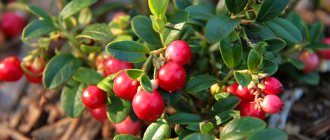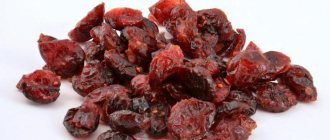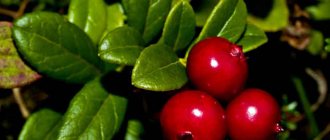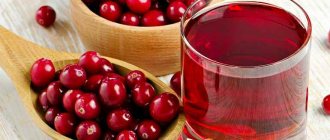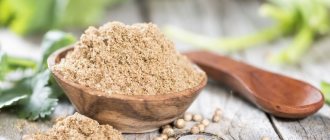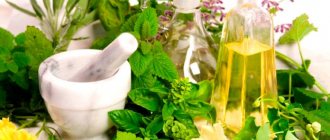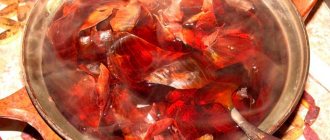Useful properties of lingonberries
Lingonberry berries and leaves are a source of important microelements. 100 grams of berries contain:
- Nicotinic acid (vitamin PP) - 0.2 mg. Takes part in the functioning of the endocrine system, improves blood circulation, and removes toxic substances from the body.
- Retinol (vitamin A) - 8 mcg. Strengthens immune defense, improves the synthesis of protein fractions in the body, normalizes the condition of the organs of vision, skin and hair.
- Thiamine (vitamin B1) - 0.01 mg. Participates in metabolism, stabilizes the activity of the nervous system.
- Riboflavin (vitamin B2) - 0.02 mg. Takes an active part in metabolism.
- Folic acid (vitamin B9) - 0.03 mcg. Positively affects protein metabolism, promotes cell growth and reproduction.
- Ascorbic acid (vitamin C) - 15 mg. Strengthens the immune system, promotes the absorption of gland in intestinal tissues, improves collagen synthesis.
- Tocopherol (vitamin E) - 1 mg. Strengthens the immune system, protects cells from aging, improves cell nutrition, strengthens vascular walls.
- Calcium - 25 mg. Acts as an antihistamine and anti-inflammatory component. Reduces the excitability of the nervous system. Necessary for bone growth and activation of certain hormones and enzymes.
- Magnesium - 7 mg. Tones blood vessels, promotes cell regeneration, and is necessary for the contractile function of muscle fibers.
- Sodium - 7 mg. Participates in the production of gastric juice and has a positive effect on kidney function.
- Potassium - 90 mg. Stabilizes the functioning of the nervous and muscular systems, improves the conductivity of oxygen into brain cells.
- Phosphorus - 16 mg. Participates in metabolism, improves the functions of the urinary and nervous systems.
- Iron - 400 mcg. Responsible for the absorption of B vitamins and ensures cellular respiration.
Lingonberry leaves contain linolenic and linoleic acids. They have a regenerating and strengthening effect, and have a positive effect on the functioning of the heart and blood vessels.
The leaves are also rich in gallic acid, which is an antioxidant and antitumor substance.
In addition, the leaves contain tannin, which has a hemostatic and astringent effect, and arbutin, a trace element with antiseptic properties. The peel of lingonberries is rich in ursolic acid, which has an anti-stress effect.
This is not the entire list of useful micro- and macroelements contained in the leaves and fruits of lingonberries; there are many more of them. Due to the rich content of minerals and vitamins, lingonberries are recommended for women during pregnancy.
General information. The benefits of lingonberries and fruit juice from them
It is recommended to drink lingonberry juice chilled. This drink easily replaces coffee or tea. And, in addition to liquid, you will receive many different active substances, minerals and vitamins. Morse will lift your mood and improve your appetite. Its benefits have been known since ancient times. First of all, the drink helps treat bone tissue and joints; it is recommended for cystitis, breast tumors and kidney stones.
But, unfortunately, there are individual contraindications to its use. This drink should not be drunk by those who suffer from colitis, gastritis and other stomach diseases, as due to increased acidity the disease may worsen.
Eating lingonberries during pregnancy
To answer the question whether it is possible to eat lingonberries during pregnancy, you need to see a list of the beneficial properties of this plant.
So, lingonberry fruits and leaves are used for the following purposes:
- prevention and treatment of kidney and bladder diseases: cystitis, nephropathy of pregnancy, pyelonephritis and urolithiasis;
- treatment of liver pathologies;
- prevention and treatment of respiratory system diseases;
- reduction in temperature for colds and flu;
- improving the functioning of the endocrine system;
- normalization of metabolism;
- treatment of edema, which often appears in the second half of pregnancy; Read more: swelling during pregnancy→
- elimination of heart pain, prevention of tachycardia;
- decreased blood pressure, surges in which are dangerous for the developing fetus and the course of pregnancy;
- cold treatment;
- treatment of iron deficiency anemia as a preventive method to prevent fetal hypoxia;
- combating constipation and slow digestion;
- stabilization of the psycho-emotional state of women, relieving anxiety;
- elimination of joint pain.
What to consider
Tea with lingonberries during pregnancy can be consumed throughout the entire period. It’s great that lingonberries demonstrate the highest efficiency, but that’s why you should be extremely careful with dosages. Excessive consumption of fresh berries, decoctions and tinctures can disrupt the normal functioning of the excretory system, primarily the kidneys.
Cranberries and lingonberries during pregnancy are not the best option if a woman experiences an allergic reaction to the plant or its active substances. That is why you should start taking it in small portions; if even the slightest reaction is detected, you should stop eating such a useful berry in all its forms. In addition, it would not hurt to consult with a gynecologist leading the pregnancy. Increased acidity, developing gastritis, peptic ulcers, kidney stones - all these are contraindications for consuming lingonberries. Eating berries even in small quantities can lead to an exacerbation of the disease. It was mentioned above that lingonberries lower blood pressure, which is why it is contraindicated for all hypotensive patients. All decoctions and tinctures must be taken on an empty stomach. Never consume them during or after meals. The most favorable period for picking berries is late summer-early autumn. Definitely, lingonberries should be present in the diet of every expectant mother. In general, to combat many ailments that torment pregnant women, it is first of all worth resorting to traditional medicine methods. It can demonstrate good effectiveness while remaining absolutely safe for both the woman and the unborn baby.
How to properly consume lingonberries during pregnancy?
Both berries and leaves of the plant are used for the prevention and treatment of various pathological conditions. The berries can be eaten fresh, juice or fruit drinks can be made from them, and the leaves can be used to prepare an infusion or decoction.
The effectiveness of lingonberry products varies, so using a specific product in a certain situation will be more effective than using another. For example, lingonberry decoction during pregnancy is recommended for edema.
Decoction of lingonberry leaves
Lingonberry decoction during pregnancy will help cope with swelling and relieve symptoms of inflammation of the urinary system. The natural composition of the decoction does not contain harmful components that could harm the mother and unborn child.
To prepare the decoction you will need 2 tbsp. l. leaves and 250 ml of boiling water. Lingonberry leaves are brewed with boiling water and brought to readiness for 30 minutes in a water bath. After the broth has cooled, it is divided into 3 servings and taken before meals during the day.
Infusion of lingonberry leaves
An infusion made from lingonberry leaves helps lower high blood pressure. It also helps improve the well-being of expectant mothers suffering from diabetes and gastritis with low acidity.
To prepare the infusion, you need to take 2 tbsp. l. lingonberry leaves, 3 tbsp. l. strawberry leaf and a pinch of lavender. All ingredients are placed in a thermos and brewed with 2 cups of boiling water. It is better to prepare everything in the evening, then in the morning the infusion will be ready for consumption. You should drink 1/2 cup of infusion before meals 4 times a day.
Lingonberries
The berries contain more vitamins and minerals than the leaves. They quickly quench thirst and also help cope with swelling.
It is not advisable to eat berries on an empty stomach, since they can cause side effects on the digestive system and interfere with the well-being of an existing ulcer or gastritis of the stomach.
Juice and fruit drink from berries
Lingonberry juice or fruit drink during pregnancy helps relieve symptoms of hypertension and cope with iron deficiency anemia.
Both of these drinks strengthen the immune system and act as a sedative on the expectant mother’s body. They drink juice and fruit drinks for colds and coughs, and use them as gargles for sore throats.
To prepare fruit juice, you will need 1 cup of fresh lingonberries. Mash the berries, add 2 cups of cold water and bring to a boil. Turn off the heat and leave the fruit drink to steep until it cools completely.
Strain the cooled drink through cheesecloth and add sugar to taste.
No matter how beneficial lingonberries are, it is not recommended for expectant mothers to use them uncontrollably. The dosage of any herbal remedy not agreed with the doctor can harm the health of the woman and the unborn child.
Lingonberry leaves and fruits, consumed in large quantities, can increase the tone of the muscular layer of the uterus. Read more: uterine tone during pregnancy→
Lingonberry in the fight against edema
Lingonberry for edema is one of the best and safest remedies that helps remove excess fluid that has stagnated in the body of the expectant mother. Swelling of the legs and feet most often develops in late pregnancy. The cause of their occurrence is most often the pinching of veins and lymphatic vessels by the uterus, which is steadily increasing in size.
Another factor contributing to fluid retention is the increased concentration of proteins and salts in the body of a pregnant woman. Severe swelling combined with high blood pressure can lead to a dangerous pregnancy complication called preeclampsia. To prevent the development of edema, experts recommend taking fresh lingonberries and decoctions of leaves and fruits from the first months of pregnancy.
Fruit drinks and decoctions from lingonberries, which have a diuretic, anti-inflammatory, disinfectant and diuretic effect, will help get rid of swelling localized in the lower and upper extremities, lower back and face.
Contraindications
The use of lingonberries in any form is prohibited under the following conditions:
- peptic ulcer of the stomach and duodenum;
- gastritis;
- cholecystitis;
- urolithiasis disease;
- allergy to lingonberries;
- low blood clotting, tendency to any kind of bleeding.
With caution, lingonberries can be used by women with a tendency to low blood pressure and high stomach acidity.
Treatment with any folk remedies during pregnancy should be agreed with a doctor.
Since lingonberry has a diuretic effect, uncontrolled use of infusions and decoctions based on it can lead to dehydration, dizziness and weakness. A decrease in blood pressure, which can be caused by berries eaten in large quantities, is also dangerous.
All proportions and quantities of lingonberry products consumed can only be determined by a doctor. And then this plant will only bring benefits.
Author: Olga Rogozhkina, doctor, especially for Mama66.ru
Recipes
There are several different options for preparing lingonberry juice. A drink made from fresh and frozen fruits will be equally useful. When choosing a suitable recipe, you need to take into account your health status.
If you have a history of gastritis with high acidity in remission, it is better to use cooking options that involve cooking or using frozen berries. With these types of processing, the product loses some of its organic acids, so it cannot cause an exacerbation.
If pregnancy is proceeding normally, or there is a history of gastritis with low acidity, then it is better to use recipes that involve the use of fresh berries.
Simple recipe
For this option you will need:
- 3 cups of ripe clean berries;
- 2 liters of boiled water, cooled to room temperature;
- 200–300 g sugar.
Preparation:
- Grind the berries until mushy.
- Squeeze the resulting mass through cheesecloth.
- Combine the pulp with water and boil.
- Add sugar and lingonberry juice to the liquid.
Drink 1-2 glasses a day, before lunch. Store in the refrigerator for no longer than 3 days.
